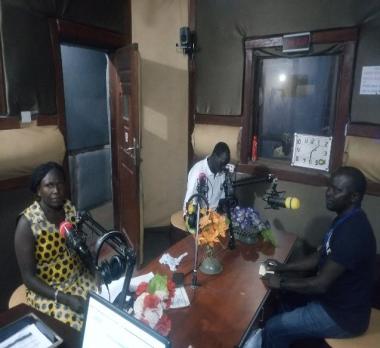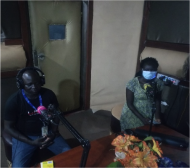Working in some of the hardest places in the world to be a woman also sometimes means working in some of the hardest places in the world to access healthcare or clean water or even cellphone reception.
Since reopening our program in South Sudan last year, our team has innovated ways of sharing some of what women learn in their lessons with the broader community in Yei. Members from our team would join up with participants from the program to host radio programs that would discuss information complementary to the program curriculum. Listeners would also call in with their questions, bringing more insight on issues like health, but also women’s rights.
Radio is a reliable means of communication in communities we serve, like South Sudan and the Democratic Republic of Congo, because of its high popularity in the community and the trust listeners have in the information and its accuracy. So when COVID-19 became a global concern, our staff in South Sudan saw the importance of maintaining this channel of communication especially with women living in rural and remote areas without access to cellphone service. Not only was radio a way to broadcast accurate health info to the broader community, but with in-person trainings suspended and women no longer congregating in classes, radio could be a lifeline to ensure women had information to protect themselves and their families from disease.
Throughout April, our South Sudan team has joined weekly broadcasts with health experts, such as members of the local government task force, members of the Ministry of Health, and WHO coordinators. Together, they educate listeners on a range of topics about COVID -19, beginning with what the disease is, identifying it, and how it spreads. In later weeks, the program dove into topics such as practices that help prevent the spread of coronavirus in terms of hygiene as well as social distancing, what factors increased the risk of contracting the disease, and how to manage it.
As with the program our staff and participants usually deliver, listeners called in with questions and received answers from experts. They asked questions that helped dispel myths about the disease, what to do in local markets, and learned about local strategies to address the pandemic.
The success of the radio program in South Sudan has inspired our team in the DRC, where cellphone reception, access to personal phones, and literacy are also challenges for women we serve.
Our team in DRC partnered with the local government’s Ministry of Health to air radio programs about COVID-19 and the local response (pictured at top). As with the broadcasts in South Sudan, listeners in the DRC can call in with questions and get answers from our staff, members of the ministry of health, and experts in Ebola — another infectious disease that has provided lessons on how to contain the spread of illness that is also rearing its head once more alongside coronavirus.
Alongside broadcasts, our team continues to work with the local government and experts to produce radio spots, advertisements that air in French and Swahili throughout other radio programming to regularly educate people on preventing the spread of COVID-19.
During this crisis, we have been so inspired by the dedication that our teams have shown to staying in contact with women we serve. Their agility and ability to adapt to delivering information from afar has helped equip women and their communities to protect their health and safety.
Over the next few days, we’ll share with you some other ways that we’ve been staying connected without contact to contain the spread of coronavirus throughout our global programs.


